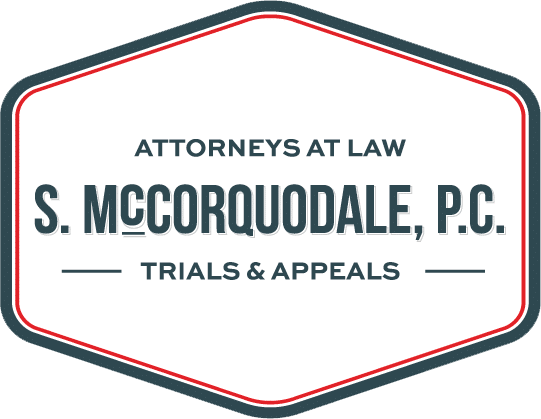On-the-Job Injuries
I was Injured at Work. Can I Sue My Employer?

Texas has created a workers’ compensation program under the Texas Workers’ Compensation Act (the “TWCA”). The TWCA was adopted to provide prompt remuneration to employees who sustain injuries in the course and scope of their employment. The act relieves employees of the burden of proving their employer’s negligence, and instead provides timely compensation for injuries sustained on-the-job. In exchange for this prompt recovery, the act prohibits an employee from seeking common-law remedies from his employer, as well as his employer’s agents, servants, and employees, for personal injuries sustained in the course and scope of his employment.
I WANT TO SPEAK TO A SPECIALIST NOW
All consultations are strictly confidential.
A no-nonsense technician; a grinder’s mentality. Mr. McCorquodale handles trials and appeals. Sandy has been bringing his unique combination of experience, skill, humor, and attitude to clients here in Texas for more than 35 years with a core belief that a straightforward, honest analysis and execution will always trump over tough talk and empty promises.
He represents clients throughout Texas in lawsuits involving personal injuries, wrongful death, traumatic brain injuries, financial disputes, insurance coverage, lawyers’ professional liability, accounting malpractice, contract claims, employment claims, hurricane claims, workers’ compensation claims, explosion claims, fraud and misrepresentation, fiduciary liability under ERISA, securities fraud, directors’ and officers’ liability, claims under the Texas Deceptive Trade Practices Act, franchisor- franchisee litigation and other matters. He represents clients in individual lawsuits, mass action lawsuits and class action lawsuits. He handles lawsuits in state and federal courts across the State of Texas and before the Division of Workers’ Compensation.
FAQ
Employers may opt-out of the workers’ compensation program. When they opt-out, they are considered a “non-subscribing employer,” and they forgo certain benefits provided by the TWCA. In particular, the TWCA vests employees of non-subscribing employers with the right to sue their employers for work-related injuries, and the TWCA deprives the non-subscribing employer of the traditional common law defenses of contributory negligence, assumption of risk, and the fellow-servant rule. The Texas workers’ compensation construct contemplates two systems, one in which covered employees may recover relatively quickly and without litigation from subscribing employers and the other in which non subscribing employers are subject to suit by injured employees to recover for their on-the-job injuries.
Although Texas law creates an incentive for employers to obtain workers’ compensation insurance coverage by eliminating certain defenses, a non-subscribing employer is not automatically obligated to compensate an injured employee. Instead, an employee-plaintiff must prove the elements of his negligence or other claim just as any other litigant. Section 406.033(d) of the Texas Labor Code provides that in an action against a non-subscribing employer, “the plaintiff must prove negligence of the employer or of an agent or servant of the employer acting within the general scope of the agent’s or servant’s employment.” Tex. Lab. Code Ann. § 406.033(d). The TWCA creates a system in which the employee of a non-subscribing employer must prove the negligence of the employer, but the employer cannot rely on the defense of contributory negligence, assumption of risk, or the fellow-servant rule.
Texas law recognizes that an employer owes its employees certain non-delegable duties, including:
❏ To provide them a safe place to work.
❏ To furnish the employee with safe and suitable equipment so that he may carry on the work with reasonable safety.
❏ To provide proper instruction and training for performing assigned tasks.
❏ To provide adequate help in performing a work assignment.
❏ To warn employees of potential hazards.
❏ To affirmatively provide medical care and assistance to an employee when the employee is incapable of helping himself and has an immediate and urgent need for medical assistance.
An employer must exercise ordinary care, based on standard negligence principles, in carrying out these duties. If an employer is negligent in carrying out these duties and causes the employee’s injury or death, the employer may be liable to pay damages.
If you or a loved one has been killed or seriously injured in an on-the-job injury, contact the law firm at (833) 712-4472 to learn more about your options. Your initial consultation is completely free and confidential.
The law firm can meet you at home, in the hospital, or at the law firm’s office. The law firm can also meet you via videoconferencing for a contactless discussion.
I WANT TO SPEAK TO A SPECIALIST NOW
All consultations are strictly confidential.
A no-nonsense technician; a grinder’s mentality. Mr. McCorquodale handles trials and appeals. Sandy has been bringing his unique combination of experience, skill, humor, and attitude to clients here in Texas for more than 35 years with a core belief that a straightforward, honest analysis and execution will always trump over tough talk and empty promises.
He represents clients throughout Texas in lawsuits involving personal injuries, wrongful death, traumatic brain injuries, financial disputes, insurance coverage, lawyers’ professional liability, accounting malpractice, contract claims, employment claims, hurricane claims, workers’ compensation claims, explosion claims, fraud and misrepresentation, fiduciary liability under ERISA, securities fraud, directors’ and officers’ liability, claims under the Texas Deceptive Trade Practices Act, franchisor- franchisee litigation and other matters. He represents clients in individual lawsuits, mass action lawsuits and class action lawsuits. He handles lawsuits in state and federal courts across the State of Texas and before the Division of Workers’ Compensation.
When an employee is injured on the job and receives workers’ compensation benefits, he is barred from bringing a claim against his employer. If the worker’s injuries were caused by the negligence of someone other than his employer, they have the right to pursue a claim for damages against that third party. This is known as a workers’ compensation third-party claim.
What is a Workers’ Compensation Third-Party Claim?
What is a Workers’ Compensation Third-Party Claim?
When an employee is injured on the job and receives workers’ compensation benefits, he is barred from bringing a claim against his employer. If the worker’s injuries were caused by the negligence of someone other than his employer, they have the right to pursue a claim for damages against that third party. This is known as a workers’ compensation third-party claim.
What is a Workers’ Compensation Wrongful Death Case?

THE FAMILY MEMBERS of an employee who dies while working or because of disease contracted in the workplace may have a death claim under the Texas Workers’ Compensation Act if the employer’s gross negligence caused the death. The employee’s surviving spouse and heirs may recover exemplary damages if they prove gross negligence.
Employers in Texas owe continuous, non-delegable duties to their employees. These duties include:
- The duty to furnish a reasonably safe place to work.
- The duty to warn employees of hazards of their employment that are not commonly known or already appreciated.
- The duty to supervise employees’ activities.
- The duty to hire competent co-employees.
- The duty to furnish reasonably safe instrumentalities with which to work.
- The duty to provide safety regulations.
- The duty to train employees in the safe use and handling of products and equipment used in and around an employer’s premises or facilities.
An employer must exercise ordinary care, based on standard negligence principles, in carrying out these duties. If an employer is grossly negligent in carrying out these duties and causes the employee’s death, then the surviving spouse and heirs may have a claim against the employer for punitive and exemplary damages.
I WANT TO SPEAK TO A SPECIALIST NOW
All consultations are strictly confidential.
A no-nonsense technician; a grinder’s mentality. Mr. McCorquodale handles trials and appeals. Sandy has been bringing his unique combination of experience, skill, humor, and attitude to clients here in Texas for more than 35 years with a core belief that a straightforward, honest analysis and execution will always trump over tough talk and empty promises.
He represents clients throughout Texas in lawsuits involving personal injuries, wrongful death, traumatic brain injuries, financial disputes, insurance coverage, lawyers’ professional liability, accounting malpractice, contract claims, employment claims, hurricane claims, workers’ compensation claims, explosion claims, fraud and misrepresentation, fiduciary liability under ERISA, securities fraud, directors’ and officers’ liability, claims under the Texas Deceptive Trade Practices Act, franchisor- franchisee litigation and other matters. He represents clients in individual lawsuits, mass action lawsuits and class action lawsuits. He handles lawsuits in state and federal courts across the State of Texas and before the Division of Workers’ Compensation.
